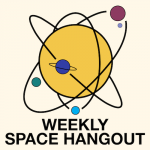Podcaster: Host : Fraser Cain ; Guest: Dave Dickinson, Michael Rodruck, Beth Johnson

Title: Weekly Space Hangout – Guest: Dr. Alan Stern: What’s On The Horizon For New Horizons
Link: Cosmoquest: http://cosmoquest.org
Description: Today’s story:
- The first detection of a built-in wobble on another planet.
- Astronomers improve the distance scale to the Universe.
- Japan planning to launch a wooden satellite.
Host: Fraser Cain ( @fcain )
Special Guest: This week we are excited to welcome Dr. Alan Stern, Principal Investigator from the New Horizons Mission, back to the WSH. In October, it was announced that Alan will be the first NASA-funded commercial space crewmember aboard a Virgin Galactic suborbital space mission. The flight is expected to take place in 2022; there he will perform astronomical and space physiology experiments.
Alan is a planetary scientist, space program executive, aerospace consultant, and author. He leads NASA’s New Horizons mission to the Pluto system and the Kuiper Belt. In both 2007 and 2016, he was named to the Time 100. In 2007, he was appointed NASA’s chief of all science missions. Since 2009, he has been an Associate Vice President and Special Assistant to the President at the Southwest Research Institute. Additionally, from 2008-2012 he served on the board of directors of the Challenger Center for Space Science Education, and as the Chief Scientist and Mission Architect for Moon Express from 2010-2013. From 2011- 2013, he served as the Director of the Florida Space Institute.
Alan’s career has taken him to numerous astronomical observatories, to the South Pole, and to the upper atmosphere aboard various high performance NASA aircraft including F/A-18 Hornets, F-104 Starfighters, KC-135 Zero-G, and WB-57 Canberras. He has been involved as a researcher in 24 suborbital, orbital, and planetary space missions, including 9 for which he was the mission principle investigator; and he has led the development of 8 scientific instruments for NASA space missions. In 1995, he was selected as a space shuttle mission specialist finalist, and in 1996 he was a candidate space shuttle payload specialist. In 2010, he became a suborbital payload specialist trainee, and is expected to fly several space missions aboard XCOR and Virgin Galactic vehicles in 2016-2017.
Before receiving his doctorate from the University of Colorado in 1989, Alan completed twin master’s degrees in aerospace engineering and atmospheric sciences (1980 and 1981), and then spent six years as an aerospace systems engineer, concentrating on spacecraft and payload systems at the NASA Johnson Space Center, Martin Marietta Aerospace, and the Laboratory for Atmospheric and Space Physics at the University of Colorado. His two undergraduate degrees are in physics and astronomy from the University of Texas (1978 and 1980).
His academic research has focused on studies of our solar system’s Kuiper Belt and Oort cloud, comets, the satellites of the outer planets, the Pluto system, and the search for evidence of solar systems around other stars. He has also worked on spacecraft rendezvous theory, terrestrial polar mesospheric clouds, galactic astrophysics, and studies of tenuous satellite atmospheres, including the atmosphere of the moon.
Alan is a fellow of the AAAS, the Royal Astronomical Society, and is a member of the AIAA, AAS, IAF, and the AGU; he was elected incoming chair of the Division of Planetary Sciences in 2006. He has been awarded the Von Braun Aerospace Achievement Award of the National Space Society, the 2007 University of Colorado George Norlin Distinguished Alumnus Award, the 2009 St. Mark’s Preparatory School Distinguished Alumnus Award, Smithsonian Magazine’s 2015 American Ingenuity Award, and the 2016 Sagan Memorial Award of the American Astronautical Society.
In his free time, Alan enjoys running, hiking, camping, and writing. He is an instrument-rated commercial pilot and flight instructor, with both powered and sailplane ratings. He and his wife Carole have two daughters and a son; they make their home near Boulder, Colorado.
You can learn more about Alan and stay up to date with him by visiting his website: https://alanstern.space/
You can stay up to date with New Horizons by visiting the Mission’s Webpage: http://pluto.jhuapl.edu/
Regular Guests:
- Dave Dickinson ( http://astroguyz.com/ & @Astroguyz )
- Michael Rodruck ( https://sites.psu.edu/mrodruck/ / @MichaelRodruck )
- Beth Johnson – SETI Institute ( @SETIInstitute / @planetarypan )
Today’s sponsor: Big thanks to our Patreon supporters this month: David Bowes, Dustin A Ruoff, Brett Duane, Kim Hay, Nik Whitehead, Timo Sievänen, Michael Freedman, Paul Fischer, Rani Bush, Karl Bewley, Joko Danar, Steven Emert, Frank Tippin, Steven Jansen, Barbara Geier, Don Swartwout, James K. Wood, Katrina Ince, Michael Lewinger, Phyllis Simon Foster, Nicolo DePierro, Tim Smith.
Please consider sponsoring a day or two. Just click on the “Donate” button on the lower left side of this webpage, or contact us at signup@365daysofastronomy.org.
Or please visit our Patreon page: https://www.patreon.com/365DaysOfAstronomy
End of podcast:
365 Days of Astronomy
=====================
The 365 Days of Astronomy Podcast is produced by Planetary Science Institute. Audio post-production by Richard Drumm. Bandwidth donated by libsyn.com and wizzard media. You may reproduce and distribute this audio for non-commercial purposes.
This show is made possible thanks to the generous donations of people like you! Please consider supporting to our show on Patreon.com/365DaysofAstronomy and get access to bonus content.
After 10 years, the 365 Days of Astronomy podcast is poised to enter its second decade of sharing important milestone in space exploration and astronomy discoveries. Join us and share your story. Until tomorrow! Goodbye!

